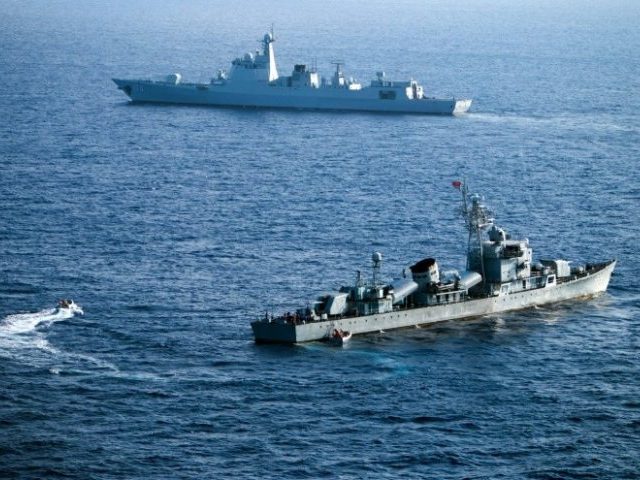President Trump should increase the U.S. military’s presence in the South China Sea to counter a rising and increasingly belligerent China before that country’s territorial ambitions become unstoppable and make it impossible for America to come to the defense of Taiwan or other allies in the region.
The failure of America to take a stand now could risk a repeat of the lessons of 1938 when attempts to appease Hitler with the annexation of the Sudetenland opened the door to Germany’s invasion of Poland and then the whole of Europe.
Under President Obama, the United States did little more than stomp its feet and demand Beijing behave according to international law. In the face of American inaction, Beijing thumbed its nose and grew more emboldened.
China has claimed the entire South China Sea and its natural resources as its sovereign territory, and it has militarized a number of reclaimed islands in disputed waters over the objections of Vietnam, the Philippines, Malaysia, and Brunei.
Few places on the map are as strategically important as the South China Sea, which sees $5 trillion worth of shipping trade each year. The area is believed to contain large quantities of undiscovered oil, natural gas and mineral deposits.
The South China Sea is one of the most important energy trade routes in the world with almost a third of global crude oil and over half of global liquefied natural gas passing through it each year. The energy security of U.S. allies Taiwan, Japan, and South Korea depends on the oil and gas shipments from the Middle East that must travel through the South China Sea.
Under the Obama administration, U.S. policy toward China was one of appeasement in an all-out effort to avoid conflict with Beijing.
Obama failed to forcefully confront China as it expanded its territorial claims in the South China Sea, dutifully playing the role of Neville Chamberlin as China intimidated our allies. But in the absence of American power, China’s appetite for expanding its influence and territorial claims in the South China Sea went largely unchecked.
The result has been an emboldened China that has militarized its position in the region through land reclamation activities and been openly aggressive in its encounters with American vessels.
I was with then-President Benigno Aquino III of the Philippines when he learned that China had deployed missiles on the Woody Island in 2016. He warned that the West’s appeasement would not satisfy China’s appetite for territory and would ultimately destabilize the region.
While President Trump did not create the current showdown with Beijing, he should take a firm stand while the United States still has the upper hand in the South China Sea. That window of opportunity will not remain open forever. China is rapidly modernizing its military, particularly its naval fleet, and strengthening its grip on the region.
China’s territorial expansion is no more defensible than Nazi Germany’s seizure of the Sudetenland region of Czechoslovakia in 1938. If left unchecked, it will expose the whole of Southeast Asia to China’s nationalist goals.
Having gotten the best of one U.S. president, Beijing is now testing President Trump. The President should be wary of those who warn against taking a hard line with China. Beijing respects one thing, strength.
Failure to confront China over its aggression in the South China Sea and inaction on the North Korea nuclear threat will confirm what Beijing already believes about America – that it is a nation in decline.
China wants America out of the South China Sea so that it can have a free hand to determine the future of the region. A U.S. surrender in the South China Sea will only encourage Chinese nationalists who want to address perceived historical grievances.
So far, President Trump has shown a deeper understanding of the strategic importance of the South China Sea. He recently ordered an increase in U.S. military patrols in the region to ensure freedom of navigation. But more needs to be done to protect interests of the United States and our allies.
President Trump should send a clear signal to Beijing that its attempts to dominate the world’s most important waterway will not be tolerated. Nothing less than America’s status as a superpower hangs in the balance.
Dan K. Eberhart is the CEO of Canary, LLC and a board member of the Los Angeles World Affairs Council who lived in Singapore for several years.

COMMENTS
Please let us know if you're having issues with commenting.